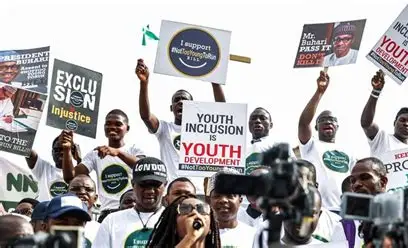Herein this article, we discussed why more young Nigerians must run for offices, young people represent the majority, energy, innovation, and new ideas, ending the cycle of “recycled” leadership, the “not too young to run” law opened the door, change is local—and personal, what needs to happen?
In the heart of Africa’s most populous nation lies a paradox: a young, vibrant population led largely by older generations. With over 70% of Nigeria’s population under the age of 35, it’s perplexing that political leadership remains dominated by individuals who came of age decades ago. The time has come to shift that balance. Nigeria needs its youth—not just as voters or activists—but as elected leaders shaping the future.
Young People Represent the Majority
The statistics are compelling: Nigerians under 35 form the bulk of the population. They dominate the workforce, drive innovation, and influence culture. Yet, when it comes to political representation, they are significantly underrepresented. If democracy is about representation, then Nigeria’s young people deserve leaders who understand their realities—tuition struggles, unemployment, digital entrepreneurship, and a rapidly changing world. Who better to champion those issues than peers who live them every day?
Energy, Innovation, and New Ideas
Today’s young Nigerians are not short of ideas. From tech startups to creative industries, they are rewriting the narrative of what’s possible. This same energy and innovation must be channeled into governance. Young leaders are more likely to embrace transparency, accountability, and technology-driven solutions to age-old problems. Imagine a Nigeria where government services are digital, inclusive, and efficient—ideas that come naturally to a tech-savvy generation.
Ending the Cycle of “Recycled” Leadership
One of the biggest criticisms of Nigerian politics is the recycling of the same leaders. With age and tenure often prioritized over merit and fresh ideas, progress stalls. Encouraging young people to run for office breaks this cycle. It introduces competition, innovation, and a new sense of urgency. More importantly, it signals to older politicians that they are not entitled to office—they must earn it.
The “Not Too Young to Run” Law Opened the Door
In 2018, the “Not Too Young to Run” bill was signed into law, lowering the age limit for various political positions. It was a watershed moment—but legislative change is just the first step. The real challenge lies in motivating and supporting young candidates to step forward, build viable campaigns, and win elections. The law gave young people the legal right to run—now they must seize the moment.
Change is Local—and Personal
Running for office isn’t limited to the presidency or governorship. Local government councils, state assemblies, and constituencies across the country need youthful voices. Change starts at the grassroots. When young people take leadership positions in their communities, they gain the experience, networks, and impact to eventually lead on a national level.
What Needs to Happen?
Political education must become widespread, helping young people understand how the system works and how they can participate effectively.
Mentorship and support networks are crucial. Experienced politicians, civil society groups, and the diaspora can play a big role here.
Funding remains a massive barrier. Youth-led political financing platforms and crowdfunding can help bridge that gap.
Unity among youth across ethnic and religious lines is essential to build strong, inclusive movements that reflect Nigeria’s diversity.
Nigeria’s future depends on bold, smart, and compassionate leadership. It needs leaders who understand both tradition and innovation. Young Nigerians must stop waiting to be handed the baton—they must run for it, literally. The path to a better Nigeria isn’t paved by passive hope, but by active participation. It’s time for the youth to stop being the leaders of tomorrow and start being the leaders of today.


